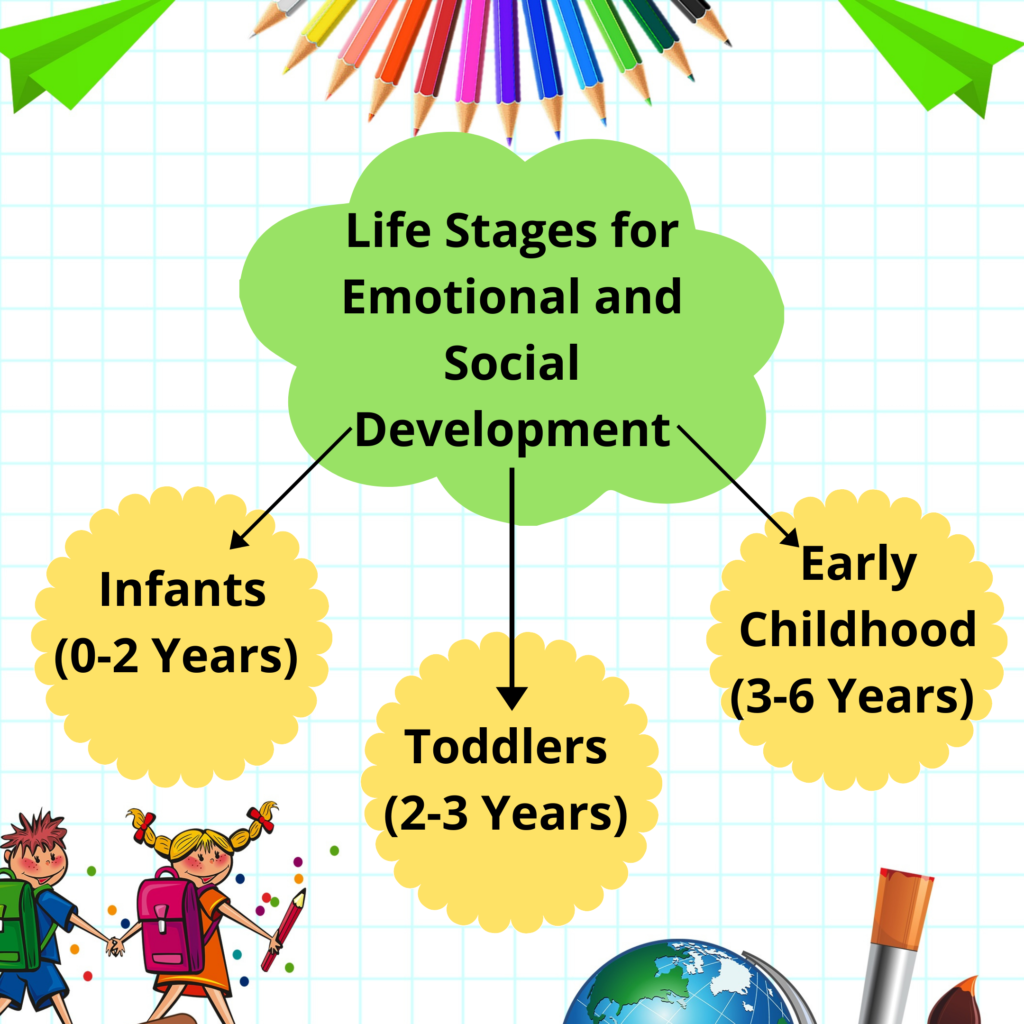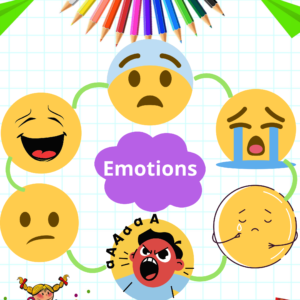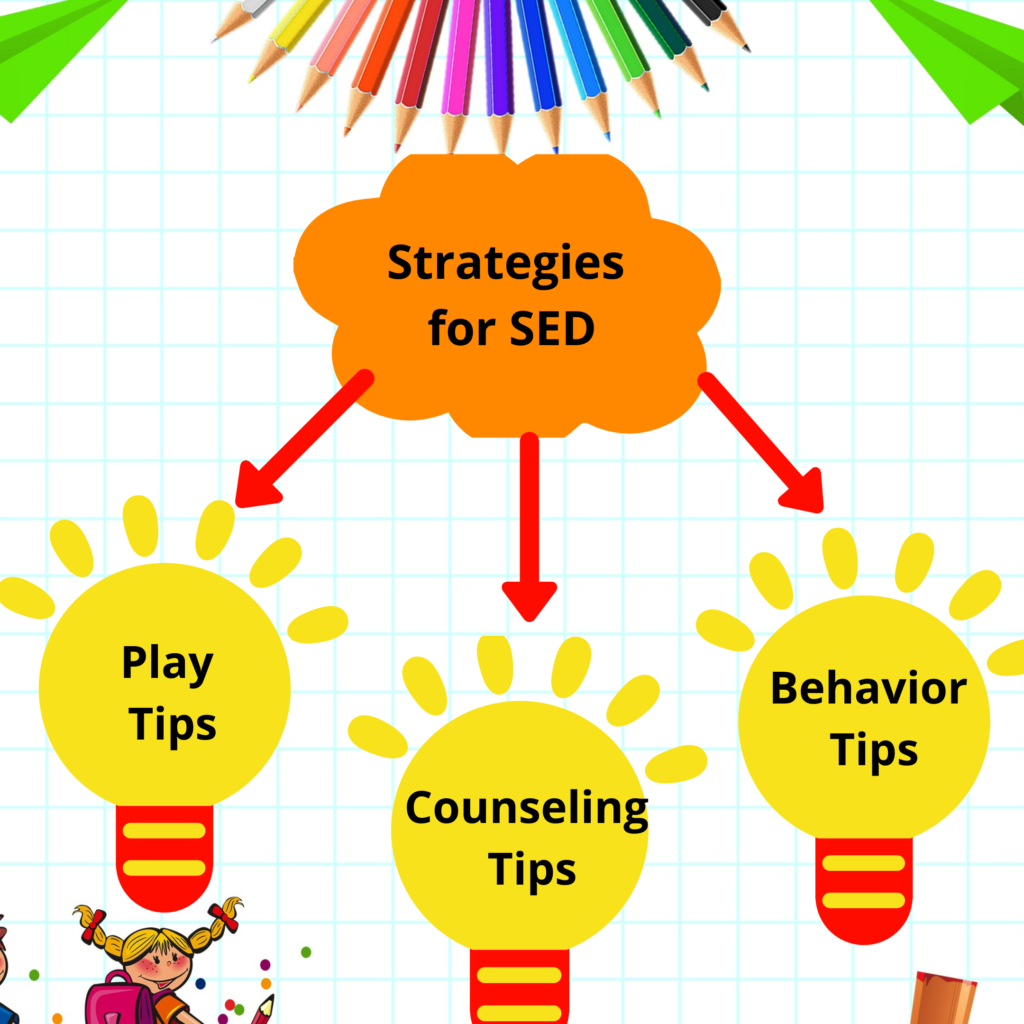First of all, we need to answer this simple question – What is Social and Emotional Development in Early Childhood?
Social and Emotional Development (SED) in early childhood means the development of social interactions and emotional awareness into a child.
In simpler terms, it means educating a child about empathy, building friendship, making teamwork, building trust, and enhancing problem-solving behaviour.
Children that are in their early childhood are not able to express their emotions as they do not understand the words to express their feelings and emotions or cannot communicate their emotions with us so, it becomes necessary to understand about the social and emotional development of children that affect them throughout their life.
According to the American Academy of Pediatrics,
Social and Emotional development in early childhood is necessary to develop overall well being and to gain prominence in public discourse.
Many other types of research also show that children who get better SED in their early childhood will gain more success in future and become more comfortable in their professional work.
So, let us discuss age-wise Social and Emotional Developments.

The above picture describes the different age-groups for SED.
- The age of 0-2 describes Infant children. At this stage, a child cannot move by himself/herself, cannot talk and walk. At this age, you just need to focus on your own actions because children usually replicate your actions.
- The age of 2-3 describes Toddlers, the children that can move, talk a little bit and walk with his knees. At this age, you need to put extra efforts like keep on smiling when you interact with a kid, always listen to their saying and try to build interest in that.
- The age of 3-5 describes children that can talk easily, can run and walk. At this age, simply ask questions like do you like your teachers, peers, activities in school/pre-school, etc. and try to find out the interests as what they are liking the most.
The above are certain age groups for social and emotional development.
Now, let us understand the emotions.

These all age groups have similar emotions like sad, happy, cry, anger, etc.
Children with these age group are susceptible; they usually face many mood swings and emotional changes. For example, when a toy is taken away from the child that belongs to him/her, the mood quickly changes from happy to sad as he/she may feel something belongs to him/her as been taken away from them. Emotional changes must be taken care as they would really affect a children’s mind in the long term.
Kids express their emotions through the following actions:
1. Temper Tantrums:
When the needs of kids are not fulfilled, they either start crying or shouting laud. This condition is also known as Outburst in which children are not able to control their emotions and just outburst (start crying). We often observe this behaviour in the markets, as when we do not buy the toys they liked, they start screaming or crying. This is the condition for temper tantrums as they do not know how to express their emotions.
2. Possessive Feeling:
It can be understood by the common word that is “Attachment”. Children often face attachment problems, and the attachments are of any kind like attachment with parents, relatives or even the attachment with a toy. Children do not know how to express their feeling or emotions; that is why they start screaming or crying whenever something is taken away from them.
3. Anger:
This is the most common emotions that children possessed. There are many ways to cope up with this anger (we will discuss further on this blog). It is the most dangerous one out of all emotions as in this a child can develop a habit of harming himself or gaming other due to his/her anger problem and this problem needs to be rectified at the initial stages.
4. Insecurity:
This emotion arises when a child does not want to share his/her thing with anyone. We often saw children in their early years do not want to go away from their parents as they find themselves insecure.
5. Screaming Hysterically:
When a kid wants to find something and not able to find that thing, then they start screaming laud or even cry as we have already discussed, they do not know how to express their emotions.
Now, coming to the major part, how to handle these emotions and how to foster healthy social and emotional development in early childhood for their well being.

The explanation of the above figure is as follows:
Children need your support to cope up with these emotional changes. They need your support to understand best how to express there feelings and emotions.
1. Build Strong Relationship:
Building a strong relationship with children always help you and your children to understand each other’s emotion. There are many methods for building a strong relationship, but we recommend you to make a truthful relationship.
Ask children about their lives at preschool or nursery as how they are doing, they have friends or not, he/she comfortable with teachers and students, any problems he/she may be facing, etc. believe us, these questions will surely help you and your children to make a strong and healthy relationship.
2. Consistent Care:
Children need consistent care; they often feel unsafe in different situations. If you focus on taking care and educating them about how to react in different situations then they may feel safe and be on track to be emotionally stable.
Consistent care, i.e. you can smile, laugh and cuddle with infants or toddlers and talk about what they want to eat, what toy they like, etc.
3. Play Together:
Parents and teachers must focus on this aspect play is the only antidote for their emotional changes. Play together is the best method to educate a child about anything. We “The Unboxing Toys” truly and genuinely believe imparting educations with the help of play is the best of the best method for the well being of children.
Parents and teachers can focus on various games and toys to educate the children about his/her emotions. For example, you can give them building blocks and tell them to make a castle with it. After they make the castle, try to teach them to give this castle to their friends or siblings, and their friends and siblings can innovate the castle and return to the child.
This helps children to learn the emotion – Sharing.
4. Talk About Emotions:
Children often confuse about how to react in different situations. Teach them different emotions like when they meet someone they need to say hello with a smile.
Another way, children copy what they see. As parents and teachers are their first role model, so they try to copy them. Try expressing emotions in front of them like sad, happy, etc. so that they may learn about expressing their emotions in different situations.
Let us learn different strategies for Social And Emotional Development in Early Childhood:

Let us further classified these 3 strategies:
1. Play Tips:
- Belly Breathing
- Calm Down Playful Activities
2. Counselling Tips:
- Talk about Emotions
- Offer comfort and reassurance.
- Teach Empathy and Cooperation.
3. Behavior Tips:
- Praise his/her Behavior
- Pay Attention to Children’s Behavior
Play Tips
1. Belly Breathing:
It is the best technique to calm down a child. We will give you some playful tip to calm down your children and help you to control one of their major emotional tantrum, i.e. Anger.
Ask your children to make both their hands in front of them and assume that in one hand they have flower and on the other hand, they have a candle.
They need to smell the flower fragrance deeply with the help of nose and exhale the breath to the candle with the help of mouth.
Caution: Do not try this when your child is experiencing anger; they will not follow you. Try when your child is in developing stage of anger.

2. Calm Down Playful Activities:
- For this, you can use a shoebox and ask your child to paint it well. Then ask them to put anything in that like their pencils, pens, etc. This will instantly calm the children as the focus now is on painting, not on other emotions.
This technique helps your children to become more stable in terms of emotions.
- Another Technique for Calm Down, You can place many toys on the floor and ask the children to pick it up without fighting with each other. This will develop social skills into children and helps to know more about social emotions and helps in developing sharing habits.
So, these are the play tips.
Counselling Tips
1. Talk About Emotions:
You can always talk about emotions and teach them different emotions with the help of toys. One of the best ways to teach emotions is, pretend to play like when two stuffed animal are fighting then they could say they are angry. And when two toys are dancing then you can say they are happy.
You must have to know the emotions of your child in order to develop their mind. You must need to develop these qualities in order to foster social and emotional development in early childhood.
2. Offer comfort and Reassurance:
When your children are screaming or crying hard do tackle those emotions politely. Tell them that these emotional changes are common and you as a parent or teachers also faces these emotions at certain times. It is ok to be angry at some time.
This gives your children the comfort that they are not alone and you are with them.
3. Teach Empathy and Cooperation:
Parents and teachers may teach children both empath and cooperation to foster social and emotional development in early childhood.
Teaching empathy, you can always ask your children about how others are feeling. Ask your children how they feel when your toy is taken away by somebody else? So, how do others feel when the same thing happens to them.
Teaching Cooperation, you can educate your children about sharing. We have given to the technique for this in play tips, we are sharing this one more time. You can place many toys on the floor and ask the children to pick it up without fighting with each other. This will develop social skills into children and helps to know more about social emotions and helps in developing sharing habits.
So, these are the counselling strategies that you must follow.
Behavior Tips
1. Praising your Children’s Behavior:
In early childhood children often suck their fingers or fist, it is completely ok as it is the first step in stabilizing the emotions. Praising the good behavior like sharing things with others, play with cooperation, etc. will be necessary as praising will help them to act the same at such situations.
2. Pay Attention Children’ Behavior:
You need to pay attention to the children’s behaviour as if you pay attention to their behavior, you will find a lot more things about them. Suppose if your child is looking at you calmly or smiling at you, you just need to smile back in order to interact with them.
If children are screaming and angry then you must need to cuddle, talk them in a soft voice and help them to solve their problems.
So, these are the reasons why you need to pay attention to your children’s behavior.
Thank you all for reading this blog i.e. social and emotional development in early childhood. We have done great research in finding out the best solutions for social and emotional development in early childhood hope you find this blog interesting and insightful.
Reference:
https://www2.ed.gov/about/inits/ed/earlylearning/talk-read-sing/feelings-teachers
VeryWell Mind.com/ Social and Emotional Development in Early Childhood
Thanks for reading, do find us on:
Facebook: The Unboxing Toys
Instagram: The Unboxing Toys
YouTube: The Unboxing Toys
Read our previous Blogs:
.gif) A Toy A Day Keeps Sadness Away !
A Toy A Day Keeps Sadness Away !



Thank you for sharing your info. I really appreciate your
efforts and I am waiting for your further write ups thanks once again.
Informative!! Thanks a lot !
It is not my first time to pay a quick visit this web site,
i am visiting this website dailly and obtain nice data from here every day.
Every weekend i used to pay a quick visit this site, for the reason that i wish for enjoyment, since
this this web site conations in fact pleasant funny information too.
I loved as much as you’ll receive carried out right here. The sketch
is attractive, your authored subject matter stylish.
nonetheless, you command get bought an shakiness over
that you wish be delivering the following. unwell unquestionably come further formerly again since exactly the same nearly a lot often inside case you shield this increase.